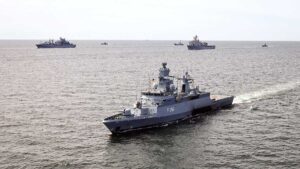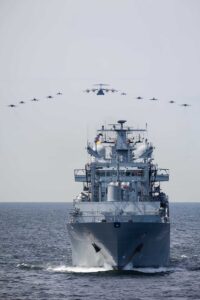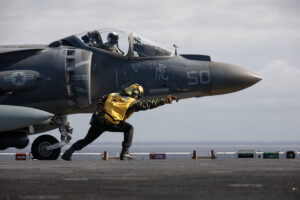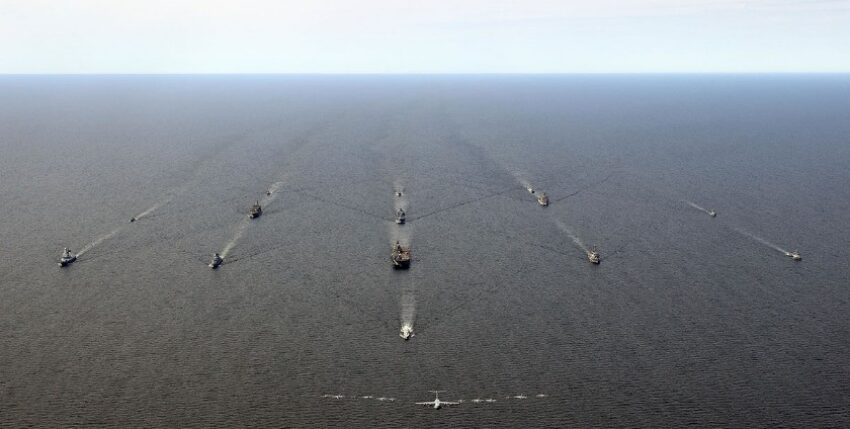BALTOPS, the largest multinational naval exercise in the Baltic Sea, took place for the 51st time from 5 to 17 June 2022. Around 7,000 soldiers from 16 nations, including Sweden and Finland, took part this time. They were spread across 47 ships and boats, 89 aircraft, as well as various offices and troop units on land.
BALTOPS stands for "Baltic Operations" and is a long-term series of exercises launched by the US Naval Forces Europe in 1972. The purpose has not changed since then: It is about training various types of naval warfare with allies, for example hunting submarines, clearing mines and landing troops. The aim is to demonstrate maritime presence in order to guarantee freedom of navigation.
The planning and execution of BALTOPS has been delegated to the Naval Striking and Support Forces NATO, abbreviated to STRIKFORNATO, based in Oeiras, Portugal, for several years. Its commander, until September 2022 US Vice Admiral Gene Black and since then his compatriot Vice Admiral Thomas Ishee, is also commander of the US 6th Fleet and deputy commander of US Naval Forces Europe and US Naval Forces Africa, all stationed in Naples.

Aircraft. In the foreground the German corvette BRAUNSCHWEIG, photo: 2022 Royal Navy / Lee Blease
Preparations for BALTOPS generally take almost a year. This includes, among other things, the development of a schedule for the purpose of harmonising the
Forces and embedding in the scenario, i.e. who does what, when and why. The exercise then consists of two phases: The first is for integration and training, the second is a free-running manoeuvre.
"BALTOPS is a great opportunity for the allies and partner nations to train together at sea, in the air and on the ground, improving interoperability and the experience of working together," emphasises James Morley, British Rear Admiral and Deputy Commander of STRIKFORNATO since April 2021. He was again in charge of the exercise in 2022.
For years, this was carried out from aboard the lead ship USS MOUNT WHITNEY, the flagship of STRIKFORNATO and the US 6th Fleet. Due to the pandemic, the exercise has been conducted from STRIKFORTNATO's Joint Operations Centre (JOC) since 2020. This year was no exception.
Scenario and forces
To mark the 500th anniversary of the Swedish naval forces, BALTOPS 22 focussed on the central Baltic Sea south of the Scandinavian country in the
Triangle with Poland to the west and Lithuania to the east.
The scenario was that energy sources would be found and developed on the seabed of the outlined sea area. However, there is disagreement between the countries concerned about how to exploit them. This led to a maritime territorial dispute. In the course of the dispute, one state denies the others - which are NATO members - free passage. The alliance is then called upon to push back the aggressor and restore international order.

For the duration of the exercise, the forces involved were split into two camps: an Allied task force and an enemy task force, each consisting of several task groups. The enemy forces were led by the then commander of the frigate SACHSEN.
In addition to his ship, the German participants included the task force provider BERLIN with SEA KING helicopters embarked, the corvette BRAUNSCHWEIG with the SEA FALCON drone, the minehunting boats FULDA and HOMBURG and the P-3C ORION maritime reconnaissance aircraft.
Testing technology and processes
BALTOPS 22 had several special features:
The most conspicuous was certainly the deployment of a US landing squadron around the amphibious assault ship KEARSARGE and the dock transport ship GUNSTON HALL. Both had hundreds of marines on board, including airmen and logistics from the "22 Marine Expeditionary Unit". For the first time in four years, two such units took part in BALTOPS. This time, they also included special reconnaissance forces, which tested new technology and procedures as part of the current reform of the US Marine Corps ("Force Design 2030").
The mine defence forces of various nations (13 boats with almost 1,000 men and women), which were remarkably well represented this year, did the same. Their focus was on new or further developed drones for detecting explosives under water.
With regard to the German Navy, the testing of the aforementioned SEA FALCON drone should be emphasised from the NATO side. Among other things, it made it possible to significantly increase the reconnaissance radius of the corvette BRAUNSCHWEIG, which was clearly noticeable during the exercise.
History and culture in an operative view
Included for the first time, but less visible than the drones, was the increasingly important topic of "Cultural Heritage Exploitation", or simply CHE. This is about how historical narratives and cultural assets such as monuments can be used by a state to justify its own actions. This has both a psychological and a physical component.
CHE operations aim to understand those aspects so as not to give the opposing side cause for disinformation or other reactions. To this end, STRIKFORNATO was advised during BALTOPS 22 by two civilian scientists researching CHE. Their advice was not solely aimed at the actions of certain troop units, but was more of a contribution to multidimensional warfare. This means that the topic was taken into account in the overall planning.
Integration of air forces
Also worth mentioning is the strong integration of air forces, which has not been seen to this extent in previous rounds of BALTOPS. The main challenge here is the coordination of the flights and the organisation of the airspace.
STRIKFORNATO was able to draw on the expertise it had gained during the NEPTUNE series. A few days before the start of BALTOPS 22, the NEPTUNE SHIELD 22 "vigilace activity" ended, in which three aircraft carrier battle groups essentially took part alongside the US landing squadron.

KEARSARGE, Photo: 2022 US Navy / Jesse Schwab
The numerous aircraft were deployed both from land and sea. For example, the amphibious assault ship carried "Harrier II" combat aircraft and "Viper" combat helicopters. Further air support came from the aircraft carrier HARRY S. TRUMAN, which was located in the Mediterranean.
The cooperation between jets, helicopters and drones made BALTOPS particularly realistic. This was also ensured by the advice of members of the NATO Space Centre, which is part of the Allied Air Command in Ramstein. Their recordings, such as the failure of satellites or reports of jammed signals, brought further realism.
Conclusion
STRIKFORNATO's overall assessment of this year's BALTOPS event is positive. All of the objectives set were achieved and at the same time new priorities were set that will need to be developed further in the coming years.
"BALTOPS 22 has tested our collective readiness and adaptability with its high level of complexity, while demonstrating the strength of our alliance and our determination to create a sea area with freedom of passage for all," summarised Vice Admiral Black.
To the author: Corvette Captain Helge Adrians serves with STRIKFORNATO and was involved in the realisation of BALTOPS 22.







